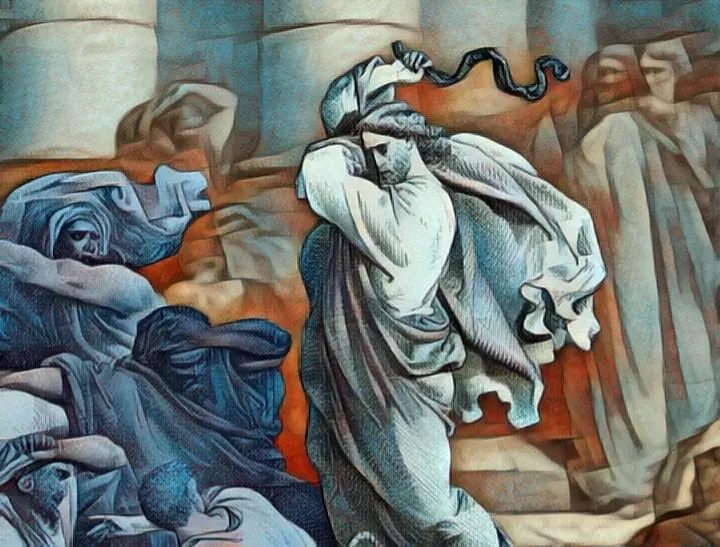The word “robbers” (lēistai) in the parable of the good Samaritan and other instances in the Synoptic Gospels may have political connotations, suggesting an indictment of the state of Israel before the war against Rome. Josephus also uses the term to describe the zealots who desecrated the temple during the revolt. Jesus’ crucifixion between two “robbers” further emphasizes the significance of this term. Josephus blames the zealots and “robbers” for the catastrophe.

In the previous post on the parable of the good Samaritan, I noted that “robbers” (lēistai) is likely to have had political overtones and suggested that, particularly given the remarkable parallel with 2 Chronicles 28:8-15, the parable could be read as an indictment of the miserable state of Israel in the build up to the war against Rome. This is a brief footnote to that observation.
The word lēistēs is quite prominent in the Synoptic Gospels. Quoting Jeremiah 7:11 LXX, Jesus accuses those doing business in the temple of making it a “cave of robbers” (spēlaion lēistōn) (Mk. 11:17). In Gethsemane, he says to the armed mob that come to arrest him, “Have you come out as against a robber (lēistēn), with swords and clubs to capture me?” (Mk. 14:48). He is crucified between two “robbers” (lēistas) in the place of the insurrectionist Barabbas (Mk. 15:27; Lk. 23:18-19).
These are key moments, and to think that merely bandits or thieves are intended may miss the point.
Today, I happened upon this passage in Josephus’ Jewish War, in which he describes intense fighting in Jerusalem between the zealots and ordinary citizens who feared the likely devastating consequences of the revolt. Josephus calls the zealots “robbers” (lēistai, lēstrikoi) no doubt pejoratively, and describes how they desecrated the temple by using it as a refuge and base for their attacks on the population—making the temple, in effect, a “den of robbers,” though he does not say as much:
…when any of the zealots were wounded, he went up into the temple, and defiled that sacred floor with his blood, insomuch that one may say it was their blood alone that polluted our sanctuary (ta hagia). Now in these conflicts the robbers (lēstrikoi) always sallied out of the temple, and were too hard for their enemies; but the populace grew very angry, and became more and more numerous, and reproached those that gave back, and those behind would not afford room to those that were going off, but forced them on again, till at length they made their whole body to turn against their adversaries, and the robbers could no longer oppose them, but were forced gradually to retire into the temple…. (War 4:201-203)
Josephus does not say that the zealots had made the temple a “cave of robbers,” but he describes elsewhere how Herod sought to crush sedition by killing “the robbers that were in the caves” (War 1:304, cf. 314).
Another passage, while we’re at it, highlights the significance of Jesus’ crucifixion between two “robbers”:
This Felix took Eleazar the arch robber, and many that were with him, alive, when they had ravaged the country for twenty years together, and sent them to Rome; but as to the number of robbers (lēistōn) whom he caused to be crucified, and of whom who were caught among them, and those he brought to punishment, they were a multitude not to be enumerated. (War 2:253)
Ezekiel 22:9 LXX goes some way towards accounting for Josephus’ usage: “Men were robbers (lēistai) in you so that they shed blood in you, and upon the mountains in you they ate; they were committing unholy acts in your midst.”
For Jeremiah the phrase “cave of robbers” referred to the hypocrisy of Jews who would murder, commit adultery, steal, swear falsely, go after foreign gods, and then come to the temple and say, “We have kept away from all these abominations” (Jer. 7:8-10).
Jesus no doubt had the traders and money changers principally in mind, but they may have stood for the whole corrupt temple system. There was a presence in the temple that frustrated its proper usage—a “house of prayer for all nations”—and put it at risk of destruction.
Josephus, of course, directly blamed the idiocy of the zealots and “robbers” for the catastrophe.
Recent comments